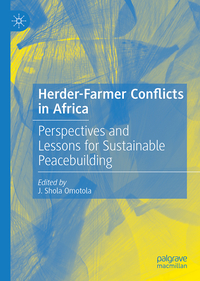
This book seeks to deepen empirical understandings of herder–farmer conflicts in Africa from the perspective of peacebuilding. Thus, the focus of the book is on the manifestations, causes, consequences and management of these conflicts (responses) by both state and non-state actors and lessons for sustainable peacebuilding. By adopting a comparative approach spanning five countries (Burkina Faso, Cameroon, Nigeria, Sudan and Togo), our study seeks not only to fill the gap, but also expand the frontier of knowledge on the subject, exploring important cross-cutting issues such as human rights, rule of law, gender and youth. The interconnections between these conflicts and security, safety and development at all levels underscore the urgency and pertinence of this study.